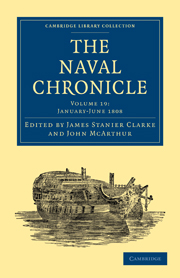 The Naval Chronicle
The Naval Chronicle Book contents
- Frontmatter
- PLATES IN VOLUME XIX. From Original Designs
- PREFACE TO THE NINETEENTH VOLUME
- BIOGRAPHICAL MEMOIR OF CAPTAIN JOSEPH ELLISON, OF THE ROYAL NAVY
- BIOGRAPHICAL MEMOIR OF THE LATE SIR CHARLES HARDY, KNT. ADMIRAL OF THE WHITE SQUADRON, GOVERNOR OF GREENWICH HOSPITAL, &C
- BIOGRAPHICAL MEMOIR OF CAPTAIN EDWARD BULLER, OF THE ROYAL NAVY
- BIOGRAPHICAL MEMOIR OF THE LATE JOHN MACBRIDE, ESQ. ADMIRAL OF THE BLUE SQUADRON
- BIOGRAPHICAL MEMOIR OF JOHN HOLLOWAY, ESQ. VICE-ADMIRAL OF THE RED, GOVERNOR OF THE ISLAND OF NEWFOUNDLAND, AND COMMANDER IN CHIEF ON THAT STATION
- BIOGRAPHICAL MEMOIR OF THE LATE CAPTAIN CHARLES LYDIARD, OF THE ROYAL NAVY
- INDEX
BIOGRAPHICAL MEMOIR OF THE LATE CAPTAIN CHARLES LYDIARD, OF THE ROYAL NAVY
Published online by Cambridge University Press: 10 January 2011
- Frontmatter
- PLATES IN VOLUME XIX. From Original Designs
- PREFACE TO THE NINETEENTH VOLUME
- BIOGRAPHICAL MEMOIR OF CAPTAIN JOSEPH ELLISON, OF THE ROYAL NAVY
- BIOGRAPHICAL MEMOIR OF THE LATE SIR CHARLES HARDY, KNT. ADMIRAL OF THE WHITE SQUADRON, GOVERNOR OF GREENWICH HOSPITAL, &C
- BIOGRAPHICAL MEMOIR OF CAPTAIN EDWARD BULLER, OF THE ROYAL NAVY
- BIOGRAPHICAL MEMOIR OF THE LATE JOHN MACBRIDE, ESQ. ADMIRAL OF THE BLUE SQUADRON
- BIOGRAPHICAL MEMOIR OF JOHN HOLLOWAY, ESQ. VICE-ADMIRAL OF THE RED, GOVERNOR OF THE ISLAND OF NEWFOUNDLAND, AND COMMANDER IN CHIEF ON THAT STATION
- BIOGRAPHICAL MEMOIR OF THE LATE CAPTAIN CHARLES LYDIARD, OF THE ROYAL NAVY
- INDEX
Summary
“Si quis id ageret, ut qualis haberi vellet, talis esset.”
Cicero de OffWhatever is presented to the public on a subject connected with our nautical concerns, cannot fail to be interesting. The proud pre-eminence to which our navy has now attained, deservedly ranks it with our first considerations: our very existence depends upon its welfare; and while the spirit and heroism which actuate its members shall continue, we can have nothing to fear from the united power of our enemies. Under the impression of such sentiments, we anticipate a favourable reception to some account of the life and services of the late gallant and unfortunate Captain Lydiard, who was wrecked in the Anson frigate, and drowned on the Cornish coast, during the tremendous storm on Tuesday the 29th of December, 1807.
In enumerating the various services of this lamented character, we shall not dwell upon those in which he distinguished himself as a junior officer; it will be sufficient to say, that from his entrance into the service, his conduct shed a lustre on his name, which, while it obtained for him the respect and approbation of his superior officers, endeared him to the hearts of his companions in the path of glory.
Young Lydiard entered the royal navy as a midshipman, in the year 1780, in the flag-ship of Admiral Darby, who then commanded the Channel fleet, and from that time served as a midshipman under several commanders, on various stations, both abroad and at home, during thirteen years.
- Type
- Chapter
- Information
- The Naval ChronicleContaining a General and Biographical History of the Royal Navy of the United Kingdom with a Variety of Original Papers on Nautical Subjects, pp. 441 - 515Publisher: Cambridge University PressPrint publication year: 2010First published in: 1808


